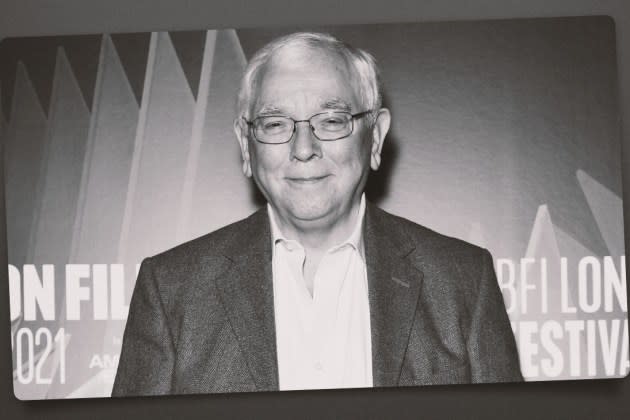Terence Davies, ‘Distant Voices, Still Lives’ Director, Dies at 77

Terence Davies, the critically beloved British writer-director who had his international art-house breakthrough with two deeply autobiographical films set in his native Liverpool, England, Distant Voices, Still Lives and The Long Day Closes, has died. He was 77.
Davies’ official Instagram account confirmed the news Saturday morning, noting that the filmmaker died peacefully at home after a short illness.
More from The Hollywood Reporter
Rome's MIA Market Boss on Exploring "Creative Possibilities" of Technology and What Is New This Year
Guillermo del Toro Confirms He Was Working on a Now-Scrapped 'Star Wars' Movie About Jabba the Hutt
Much of Davies’ work is infused with personal emotional experience, reflecting in subtle ways on growing up as a gay, Catholic man in Liverpool in the 1950s and ’60s. The filmmaker directly addressed his childhood in his 2008 feature documentary, Of Time and the City.
Premiering to great acclaim at the Cannes Film Festival that year, the doc recalled both Davies’ own family life and that of the city, using archival footage, his own commentary voiceover, classical music tracks, film clips and excerpts from poetry and literature in an assemblage by turns caustically funny and melancholy, though always heartfelt.
Davies spoke to The Hollywood Reporter at the time about the emotional process that went into the film and how he struggled to balance his faith with his sexuality.
“I went back to my parish church during the filmmaking,” he told THR. “I once prayed to be forgiven until my knees bled, and I hadn’t done anything. You can’t shake it, the guilt. You are ipso facto a sinner because you have original sin in your soul. It is wrong.”
In his review of Davies’ final film, a biographical drama about British World War I poet Siegfried Sassoon titled Benediction, THR‘s chief film critic David Rooney sang the director’s praises when referring to his earlier body of work.
“Davies set the bar high for himself with the unique films that put him on the map starting in the late ’80s,” he wrote, “two exquisitely personal family dramas set in his native Liverpool, Distant Voices, Still Lives and The Long Day Closes; the wonderful documentary about his hometown, Of Time and the City; and one of the finest film adaptations of Edith Wharton, The House of Mirth.”
The review also points out that while queer subtext had rippled through the openly gay Davies’ filmography for decades, the “profoundly affecting” Benediction was his first film to openly explore romantic love between men via a series of relationships Sassoon had after returning from battle.
Davies was born on Nov. 10, 1945, the youngest of 10 children of working-class Catholic parents in Liverpool. His mother was deeply religious and his father — whom he described as “psychotic” in a 2021 Guardian interview — died of cancer when the filmmaker was just 7.
The director attended Coventry Drama School 10 years after leaving school at 16. While he was a student there, he wrote the screenplay for the autobiographical short Children, the first part of a trilogy that included Madonna and Child and Death and Transfiguration, reflecting on his early life, his days as a young office clerk in Liverpool and his own eventual death.
Following the success of his autobiographical companion pieces — Distant Voices, Still Lives in 1988 and The Long Day Closes in 1992 — Davies made his first film set in America with 1995’s The Neon Bible. But that adaptation of the John Kennedy Toole novel about the coming of age of a boy in 1940s Georgia was poorly received in competition at Cannes. The director later conceded that the movie didn’t work, calling it a transitional film that nonetheless gave him the tools necessary to tackle The House of Mirth.
That 2000 adaptation of Wharton’s novel, starring Gillian Anderson, Laura Linney and Eric Stoltz, premiered at the New York Film Festival. Its incisive depiction of class distinctions and social cruelty in the waning years of America’s Gilded Age gave it unusual vitality for a period piece.
Davies spoke frequently in interviews about the short-sightedness of the British film industry and its fixation on mass-market commercial appeal. Despite being a figure of worldwide renown after his early films — he received awards from several international film festivals, including Cannes, Toronto and Locarno — he struggled for years to obtain financing on a number of projects.
Aside from Of Time and the City, it was 11 years until he made his next feature after The House of Mirth. That was a slow-burn adaptation of Terence Rattigan’s The Deep Blue Sea, which captured the roiling undercurrents beneath the surfaces of the British playwright’s work. The film gave Rachel Weisz one of the standout roles of her career, landing her the New York Film Critics Circle’s best actress award.
Davies went on in 2015 to make the intimate drama Sunset Song, a project that took 18 years to find funding. Based on Lewis Grassic Gibbon’s classic novel, it depicts the difficult life of a Scottish farm girl in the early 20th century. The following year, he made the fine-grained biographical portrait A Quiet Passion, starring Cynthia Nixon as Emily Dickinson.
Another five years passed before Davies’ final film, Benediction, was released in 2021. That project, again, reflected the unique intertwining of poetry and cinema in the output of a director who built up an ardent critical following over his four-decade career, even as his own national film industry had continued to undervalue him.
In the 2021 Guardian interview cited earlier, Davies reflected on the paucity of institutional recognition for his work in Britain: “It would have been nice to be acknowledged by BAFTA. But they never have. Then again, there’s also part of me that thinks: Isn’t it just vanity? If a film lives every time it’s seen, that’s the real reward.”
Best of The Hollywood Reporter

 Yahoo News
Yahoo News 